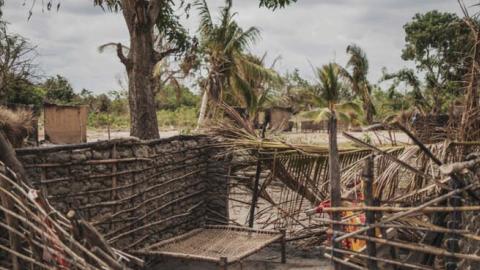On November 10, Al Jazeera posted a breathtaking headline: “ISIS-linked attackers behead 50 people in northern Mozambique.”The subhead was equally horrifying: “Witnesses say the assailants herded victims onto a football pitch in the village of Muatide where the killings were carried out.”
In the midst of a pandemic, and in the throes of a highly contested US presidential election, it isn’t surprising to encounter disconcerting news headlines. But the gruesome description of innocent people “herded” to their death on a soccer field, where they were systematically decapitated and dismembered, seems more suitable to a horror film than a present-day news report.
Despite the declaration of an African branch of ISIS taking credit for the killings and its religious tone, there has been discussion about the cause of the violence. For example, the New York Times and Al Jazeera suggest that poverty and inequality led to the attacks. This is similar to the argument that climate change is the primary source of the genocidal Fulani attacks on Christian villages in Nigeria.
Writing about the beheadings, New York Times journalist Declan Walsh quoted Sam Ratner, a contributing editor at Zitamar News. “While the militants claim to be targeting Christians, in practice they make little distinction between their victims. ISIS propaganda says they burned a Christian village or killed Christian soldiers,” Ratner said. “But on the ground, we’re not seeing a lot of differentiation between Christians and Muslims. They do not appear to be targeting churches in particular, for instance.”
Still, the fact remains that ISIS has taken credit for the attacks. And ISIS has openly and repeatedly declared its hostility toward Christians, while massacring tens of thousands of believers in multiple international locations, and with terrifying frequency across Africa.
The US State Department states that Christians comprise some 57 percent of the population of Mozambique, while the country’s Muslim population is around 32 percent. The region in which the most recent attacks took place, Cabo Delgado, is primarily Muslim. However, reports from UK researchers suggest that at least one of the two towns attacked during the recent massacre—Muidumbe—is largely Catholic.
While reporting on the November 10 beheadings, Catholic News Service pointed out that in Mozambique during Holy Week 2020, “insurgents perpetrated attacks on seven towns and villages in Cabo Delgado province, burning down a church on Good Friday, and killing 52 young people who refused to join the terrorist group.”
In July, CBN News interviewed Bishop Luiz Fernando Lisboa of Mozambique’s Pemba Diocese. He described the world’s response to the atrocities that are taking place in his country and across the world as “indifference.” He explained:
The extremists burned several Christian chapels… They attacked the church and burnt the benches and a statue of Our Lady, made of ebony. They also destroyed an image of the Sacred Heart of Jesus, to whom the parish is dedicated. Fortunately, they were unable to burn the building itself… only the benches. The world still has no idea what is happening because of indifference, and because it seems that we have already become accustomed to wars. There is war in Iraq, there is war in Syria, and there is also now a war in Mozambique.
Without a doubt the world looks tragically indifferent to Bishop Lisboa and his community. He has seen more than his share of death and destruction. But is indifference the real reason the world “has no idea” what is happening?
The fact is that violence against Christians in far-flung locations is rarely reported by Western mainstream news sources—unless the shock-value propels the story into the headlines, however briefly. And even when such tragedies are reported, as we’ve seen above, the religious aspect of the violence is either underplayed or explained away altogether.
More realistic accounts about international religious persecution often appear in small online publications such as Morningstar News, International Christian Concern, and Article 18 (in Iran), or in larger outlets like Catholic News Services and Christian Broadcasting Network (CBN). Although some of the smaller periodicals may have limited readership and less than stellar writers, they do their best to make the truth about religious persecution known to their Western readers. They give voice to local clergy, laypeople, eyewitnesses, and victims.
The fact is indifference is not an option for faithful believers in today’s shattered world. However, those of us who want to know the plight of our fellow Christians may have to search for the facts and choose to inform ourselves about the dangerous circumstances that lie behind them. Then perhaps we can find opportunities to share those stories with our friends and our faith communities, and when possible to seek action from appropriate authorities—secular and religious.
Most of all, being informed enables us to pray for the millions of suffering believers around the world. It reminds us to remember “those who are mistreated as if you yourselves were suffering.”
Read in Providence Magazine


















